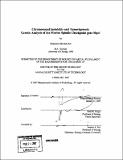Chromosomal instability and tumorigenesis : genetic analysis of the murine spindle checkpoint gene Mps1
Author(s)
Xie, Stephanie Zhi-Juan
DownloadFull printable version (11.19Mb)
Alternative title
CIN and tumorigenesis : genetic analysis of the murine spindle checkpoint gene Mps1
Other Contributors
Massachusetts Institute of Technology. Dept. of Biology.
Advisor
Peter K. Sorger.
Terms of use
Metadata
Show full item recordAbstract
The ubiquity of aneuploidy in human cancers, particularly solid tumors, suggests a fundamental link between errors in chromosome segregation and tumorigenesis. The spindle checkpoint ensures accurate chromosome segregation by delaying anaphase onset until all kinetochores achieve bipolar attachment to the mitotic spindle. Abrogation of the mammalian spindle checkpoint can cause chromosomal instability (CIN), the frequent gain or loss of entire chromosomes during cell divisions. While CIN has been proposed to be sufficient to initiate tumorigenesis, no direct evidence has shown that CIN itself is a causal agent for human cancer. To determine if CIN can promote tumor formation, I generated mice containing a conditional mutant allele of the spindle checkpoint kinase MPS1 (MpslA) and induced its expression in thymocytes. I show that MpslA is a partial loss of function allele for spindle checkpoint activation which results in chromosome missegregation in MEFs and embryonic lethality in mice. Expression of MpslA in thymocytes causes sporadic lymphomas and a decrease in thymus size. Strikingly, when MpslA was introduced into a p53 heterozygous background, all mice developed thymomas due to a loss of heterozygosity of the wildtype p53 allele. (cont.) In contrast, no p53 heterozygous micedeveloped thymomas in the same time frame when MPS1 is wildtype. Moreover, MpslA also accelerated tumor formation in p 19AF heterozygous thymocytes. I propose that MpslA-induced CIN activates p53, and results in apoptosis of the majority of SpsI A- expressirn cells. Therefore, there- ;is strong selecptiove pressure- for ;nactivation of the p53 pathway, and in those cells where p53 loss does occur, MpslA-induced CIN drives tumor development. In summary, I show that CIN caused by a weakened checkpoint is sufficient to facilitate tumorigenesis when the p53 pathway is also impaired.
Description
Thesis (Ph. D.)--Massachusetts Institute of Technology, Dept. of Biology, 2007. Includes bibliographical references.
Date issued
2007Department
Massachusetts Institute of Technology. Department of BiologyPublisher
Massachusetts Institute of Technology
Keywords
Biology.